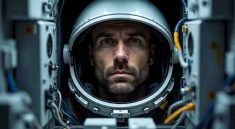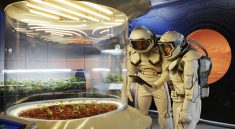Affordablespaceflight – Space to Breathe has become a defining challenge for astronauts living in extreme missions beyond Earth. As humanity pushes toward longer stays in orbit and future interplanetary travel, the ability to carve out personal space is far more than a luxury. It is essential for mental health, privacy, and crew cohesion. On the International Space Station (ISS), where six or more astronauts live and work in close quarters, even the smallest amount of private space can make all the difference.
Phone-Booth Bedrooms: Compact Sanctuaries in Orbit
In the ISS, each astronaut is assigned a sleeping quarter about the size of a phone booth. These small cabins, equipped with sleeping bags that can be secured to the wall, allow astronauts to avoid drifting in zero gravity while they rest. Inside these tiny spaces, they can keep personal belongings. Hang up family photos, and enjoy a sense of separation from the constant social interactions of communal life. Although these compartments are cramped. They represent a precious refuge for astronauts who need Space to Breathe amid the stress of microgravity, tight schedules, and limited personal freedom.
“Curtains Up: Sawdust Theatre Kicks Off Its 57th Season”
Protecting Mental Health Beyond Earth
Beyond the physical dimensions, Space to Breathe is also a psychological safeguard. Living for months on end in confined conditions poses well-documented mental challenges, including stress, irritability, and even depression. Engineers and psychologists work together to design the ISS habitat with features like adjustable lighting, soothing colors, and modular layouts to reduce tension. These design elements, along with a personal sleep cabin. Allow astronauts to retreat, decompress, and regain their sense of individual identity. While still maintaining teamwork in an extremely collaborative environment.
A Lesson for Future Missions
As plans for Mars expeditions and deep-space exploration accelerate, preserving Space to Breathe will be even more vital. Future spacecraft and habitats will need to prioritize private quarters. Mental-wellness strategies, and flexible social dynamics to keep astronauts healthy and mission-ready. The ISS offers a powerful lesson: in the vacuum of space, personal space may be just as important as air or water. Giving crew members time and room to rest, reflect, and reset can make the difference between mission success and failure.



